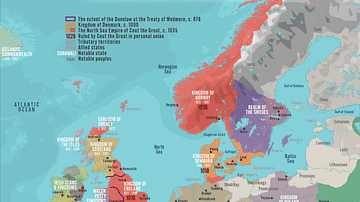Review

| Rating: | |
|---|---|
| Title: | Aethelred the Unready: The Failed King (Penguin Monarchs) |
| Author: | Richard Abels |
| Audience: | General Public |
| Difficulty: | Easy |
| Publisher: | Penguin UK |
| Published: | 2019 |
| Pages: | 136 |
"Aethelred the Unready: The Failed King" by Richard Abels is a brisk but illuminating introduction to one of England’s longest-reigning and most criticised rulers. Faced with a series of Viking invasions, Aethelred proved unworthy of his predecessors, and despite his best efforts and several strategies, he was unable to hold the English kingdom together.
In the year 1014, Archbishop Wulfstan of York stood before his parishioners and delivered a damming lecture: “Nothing has prospered now for a long time either at home or abroad, but there has been military devastation and hunger, burning and bloodshed in nearly every district time and again.” Such was his verdict on the long and unfortunate reign of Aethelred the Unready (reign 978-1016). Remembered for losing his kingdom to the Vikings and often listed as one of England’s worst rulers, Aethelred is the subject of Richard Abels’ latest book, Aethelred the Unready: The Failed King, which is part of the Penguin Monarch series, providing short and accessible introductions to many kings and queens of England.
Abels, a distinguished academic who formerly taught at the United States Naval Academy, is a leading expert on Anglo-Saxon warfare and best known for Alfred the Great: War, Kingship and Culture in Anglo-Saxon England (1998).
Across about 100 pages, his brief volume is divided into six chapters, beginning with Aethelred’s accession to the throne at the age of twelve, following the murder of his older brother, Edward the Martyr (reign 975-978). Abels then moves on to Aethelred as a boy king, initially surrounded by prudent counsellors, before he came of age, commencing his “years of youthful ignorance.” Chapter Three focuses on Aethelred’s early struggles against the Vikings, before Chapter Four breaks from the narrative to outline the early English kingdom’s political structure and system. The book then returns to the king as a mature monarch, attempting to recover from his early failings, but still largely ineffective, before ending with Aethelred’s loss of the English kingdom to the Vikings in the final years of his reign.
Abels is most at home when writing about Aethelred at war. He reminds readers that the king, while “never comfortable with military command,” was a dynamic ruler who didn’t lack initiative. He refortified old burhs, built a large fleet, led offensive campaigns into Norse bases in Strathclyde and the Isle of Man, turned Viking leaders against one another and even hired Norse mercenaries to boost his defences. Yet one idea after another failed, frequently resulting in the payment of tribute for peace, known as “the Danegeld,” a strategy famously condemned by Rudyard Kipling: “Once you have paid him the Dane-geld, you never get rid of the Dane.”
At the heart of Aethelred’s failure, Abels explains, was that “he was not a good judge of character” and was prompted by unworthy, cowardly, devious and self-interested men who both failed to defend the kingdom and led to factionalism. The king could order a fleet to be built, but he couldn’t stop rival factions – split between his sons, Aethelstan and Edmund, and his chief advisor, Eadric Streona – from using these ships to settle their own petty squabbles, which in 1009 led to the destruction of almost his entire fleet. Such was the disenchantment with the king’s rule that when Sweyn Forkbeard, King of Denmark, arrived to conquer England in 1013, Aethelred’s lords, looking to preserve their lands and titles, favoured surrender over battle.
With the book’s limited length, there is little room for an in-depth analysis of Aethelred’s personality or historiography. Perhaps in acknowledgement of this, Abels provides a helpful “Further Reading” guide for more detailed books of the king, including works by Ryan Lavelle and Levi Roach.
Like the other Penguin Monarchs books on pre-Norman kings (Aethelstan, Cnut, and Edward the Confessor), Aethelred the Unready: The Failed King is a good starting point for anyone interested in the often-forgotten period of English history between Alfred the Great and 1066.
About the Reviewer
Cite This Work
APA Style
McComb, M. (2025, July 25). Aethelred the Unready: The Failed King. World History Encyclopedia. Retrieved from https://www.worldhistory.org/review/531/aethelred-the-unready-the-failed-king/
Chicago Style
McComb, Michael. "Aethelred the Unready: The Failed King." World History Encyclopedia. Last modified July 25, 2025. https://www.worldhistory.org/review/531/aethelred-the-unready-the-failed-king/.
MLA Style
McComb, Michael. "Aethelred the Unready: The Failed King." World History Encyclopedia. World History Encyclopedia, 25 Jul 2025, https://www.worldhistory.org/review/531/aethelred-the-unready-the-failed-king/. Web. 26 Jul 2025.




